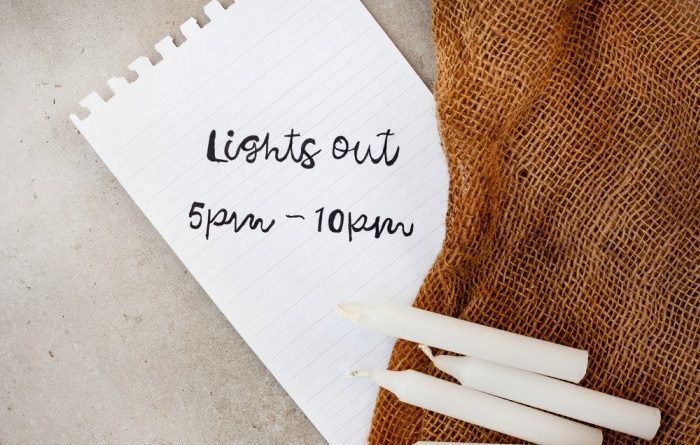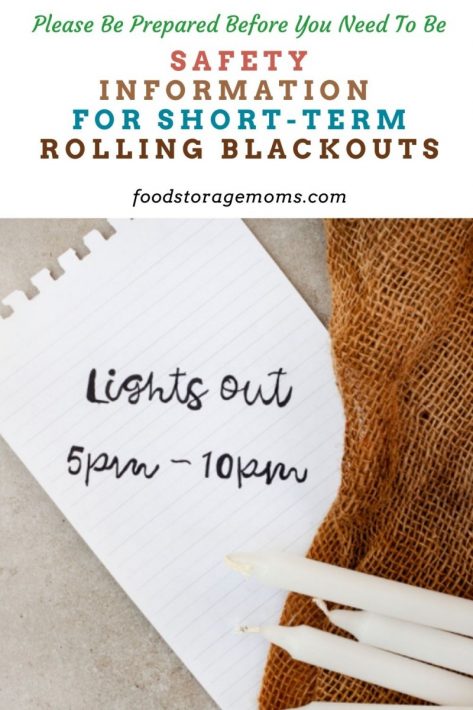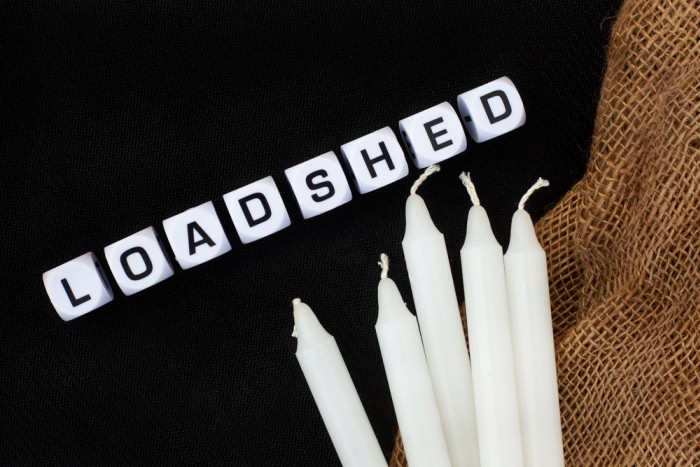By Linda Loosli

What is a rolling blackout? Short-Term Rolling Blackout is a term used to describe a situation where the power grid is overloaded and there is a risk of a widespread blackout.
To prevent this from happening, utilities will sometimes intentionally roll back power to certain areas for a short period. This usually happens during periods of high demand, such as hot summer days when everyone is running their air conditioners.
Short-Term Rolling Blackouts are usually planned and announced by utilities so that people can plan accordingly. However, they can also be caused by unforeseen problems, such as equipment failures or severe weather.
In either case, Short-Term Rolling Blackouts typically last for a few hours and are rarely longer than a day. While they can be inconvenient, they are typically much preferable to the alternative of a widespread blackout.

How Long Can A Short-Term Rolling Blackout Last?
A Short-Term Rolling Blackout (STROB) is a type of power outage that can last for several minutes to a few hours. The duration of a STROB depends on the extent of the damage or overload to the electrical grid and the availability of generating capacity.
For example, if a severe storm damages power lines, it may take several hours or even days to restore service. Local power can be affected if a power pole is hit by a car, leaving that area without power until the pole is repaired or replaced. However, if a power plant trips offline, service may be restored within minutes.
Safety Information For Short-Term Rolling Blackouts:
Short-term rolling blackouts are a type of controlled power outage that utilities use to reduce demand on the electric grid during periods of high electricity usage. They usually last for one to two hours and typically occur on hot summer days when air conditioners are running at full capacity.
Short-term rolling blackouts are different from widespread outages, which can last for days or weeks and affect a large area. Here are some tips to help you stay safe during a short-term rolling blackout:
Use a Cooler
Don’t open your refrigerator or freezer more than necessary. Keep refrigerated and frozen food items in a cooler with ice. This will help keep them from going bad in the event of an extended power outage.
Use Flashlights for Lighting
Use battery-operated flashlights or lanterns instead of candles. LED bulbs are more energy-efficient and will last longer than traditional incandescent bulbs. Another option is Chemlights. I recommend Olight Flashlights and Goal Zero Lanterns
Turn Off Electrical Equipment
Unplug electronics and appliances to prevent them from being damaged by power surges when the electricity is restored.
Do Not Use Elevators
If the power is out, do not use the elevator. Use the stairs instead. Elevators use power, so if you try to use them during a blackout, you may get stuck on the elevator.
Do Not Call 911 Unless There’s an Emergency
Only call 911 if there is a life-threatening emergency, such as a fire. Do not call 911 to report a power outage.
Get An Emergency Radio
Keep an emergency radio on hand so that you can stay informed of developments during the blackout. A battery-operated or hand-crank radio is best, as it will continue to work even if the power is out.
What is Load Shedding?
This is another term referring to the intentional reduction or cut back in electrical service to an area, thus “shedding” some of the electrical load on the grid to prevent the whole system from shutting down. The need to shed is usually prompted by too much demand on the grid system in a particular area. The grid system is pretty sophisticated and is designed so municipalities can effectively share the power being generated and shift available power from one location to another.
The shedding process becomes necessary when there isn’t sufficient power to supply the demand being placed on the system. The grid usage is adjusted such that one area has its usage shut down for a short period, and then the power is restored as a different area is restricted. In most cases, the utilities are well aware of pending shortages based on historical experience. That benefit can be lost during times of unusual weather patterns, storms, and mechanical challenges at generating plants.
In the best scenarios, the local utility will have some flexibility to bring on additional generators to meet demand. That isn’t always possible, so they will need to notify power users when they will be shedding the power to an area so users can be best prepared to deal with the situation in advance.
Utilities are aware of the effects of shedding and try to minimize their use. When large companies, particularly those relying on large amounts of power, are told their power will be cut off, it can have devastating consequences. They may have to adjust work schedules or even lay employees off if experienced frequently. That can then have a negative effect on the local economy and possibly make for instability in local politics as the population is challenged to feed and house families.
Picture the effects on a community if load shedding is used at local schools, hospitals, fire departments, and government agencies serving the less advantaged like the sick and elderly.

Be Prepared
Short-term rolling blackouts are relatively rare, but they can happen. By being prepared, you can minimize the inconvenience and keep yourself and your family safe.
How Can I Prepare For A Rolling Blackout?
There are a few things you can do to prepare for a rolling blackout:
- Keep a stock of non-perishable food items and water.
- Have a cooler on hand to keep food from spoiling.
- Keep flashlights or lanterns with fresh batteries in an easily accessible location.
- Unplug electronics and appliances before the power goes out to prevent damage from power surges.
- Know where the manual release handle is for your building elevator in case you get stuck.
- Keep an emergency radio on hand to stay informed of developments during the blackout.
- Create an evacuation plan. Be familiar with your area and know alternate routes in case roads are blocked by downed power lines.
- Consider investing in a backup generator. A generator can make sure you have power even when the power is out.
- Stay cool with just water and these awesome Frogg Toggs Chilling Towels
What to Do After a Short-Term Rolling Blackout
Once the power is restored, don’t turn on all the appliances and electronics at once. This can cause another power outage. Turn on only essential items first, and then slowly add other items as needed.
Also, check your food for spoilage and consider throwing out anything that is thawed out and has been exposed to temperatures above 40 degrees Fahrenheit for more than two hours.
How Can I Do My Part To Help Prevent Short-Term Rolling Blackouts?
If you live in an area that’s prone to short-term rolling blackouts, there are a few things you can do to help prevent them:
Use Large Appliances During Off-Peak Hours
First, try to use large appliances during off-peak hours. This includes things like an electric kitchen oven, laundry appliances, dishwashers, and electric water heaters. If everyone does this, it can help to ease the strain on the power grid. The next time you need to replace an appliance, consider buying one that has a higher energy efficiency rating, thus using less power. Doing so can help reduce power consumption, but also save you money in the long run.
Unplug Appliances You Aren’t Using
Another way to help prevent rolling blackouts is to unplug appliances you aren’t using. This includes things like computers, TVs, and stereos. Even when they’re turned off, some of these devices can still use power. So by unplugging them, you’re helping to conserve energy.
Educate Yourself About Energy Conservation
You can also help prevent rolling blackouts by educating yourself about energy conservation. There are several simple things you can do to conserve energy, such as turning off lights when you leave a room and setting your thermostat a few degrees lower in the winter and the air conditioner temperature higher during the hot summer months.
Consider swapping out your light bulbs for more efficient LED bulbs. Mark and I did that years ago and it has made a real difference in our utility bills, and we don’t have to replace the bulbs as often. We also put screens on the windows that are designed to let less light in and reduce heat during the summer. Adding insulation in our attic also made our heating and cooling systems much more efficient as the seasons and temperatures changed.
If you are going to be away from home for work or a vacation, consider using a programable thermostat to adjust the temperature in your home for those periods you’ll be gone.
Smart Home Technology is another way to conserve energy. You can use it to track and optimize your energy usage which can dramatically reduce demand.
Improve Your Home’s Energy Efficiency
Finally, you can help prevent rolling blackouts by improving your home’s energy efficiency. This includes things like sealing drafts, insulating your walls and attic, and replacing old windows. Improving your home’s energy efficiency will not only help to prevent rolling blackouts, but it will also save you money on your energy bills.
More on Power Outages and Blackouts
- How to Build a Power Outage Kit
- Supplies Needed For a Power Outage
- Power Grid Failure: What You Will Need
- Tips For Cooking When The Power Goes Out
In case you’re interested here is a link for Power Outages In The US
Final Word
Rolling blackouts are a possibility in many parts of the United States this summer, so it’s important to be prepared. Make sure you have an emergency kit stocked with water, food, and supplies that will last at least 72 hours. If you don’t live in an area that is prone to short-term rolling blackouts, consider helping your neighbors or friends who do by sharing this information with them.
Have you ever had a rolling blackout? What would you recommend stocking up on? Share your thoughts in the comments below! May God Bless this world, Linda
Copyright Images: Load Shedding Depositphotos_571713666_S by AninkaBongersSut, Lights Out Load Shedding Depositphotos_571737962_S by AninkaBongersSut
No comments:
Post a Comment